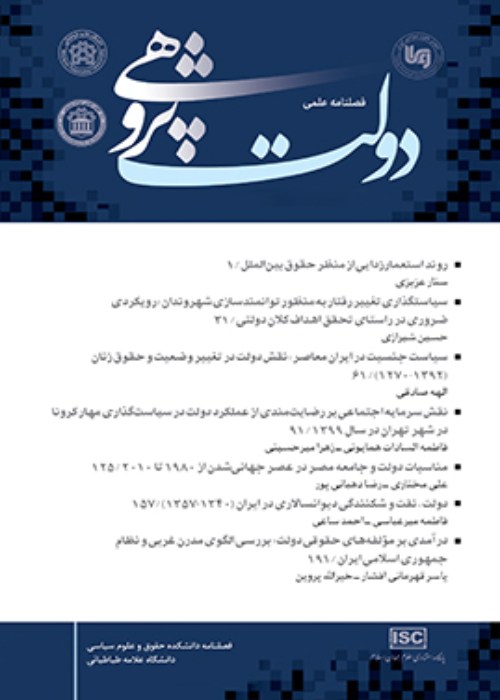Politics, Paidea and the State: The Political and Its Inter-Subjectiv Foundtion
Author(s):
Abstract:
For centuries one of the most important issues studied by philosophers and political theorists relating to the concept of state should be investigated in relation with the matter of education and politics. This issue has been, in a way, the first theoretical conjuncture regarding the politics in the ancient Greek, and studying state and related issued is still of much importance; this is up to the point which every question regarding the quiddity of state, politics, and concepts where these notions necessitate is the question on the qualities related to the education in a political society. In another words, every form of political dominance is directly related to the claims regarding state’s intervention in existing educational procedures in a society. I begin this article by an explanation on the quiddity of politics and also the relationship of politics to each one of us as its main subjects. Accordingly, I will try to explain the way what is known as community beyond the state is formed, as bedrock consisted of, in a way, spontaneous people, and the intervention of politics to orient this spontaneous being togetherness regarding authorities special recalling. At the end of this article, I will explain that why we should consider education as the most justifying factor of different forms of political authority, and a main factor in interventionist claims of the state in public daily life. This article is a discussion on political ontology which investigates the way ontological coordinates of politics take shape. The latter claim should be studied in relation to which relationship the authors of this article make between the meaning and politics. In a more accurate way for us, and regarding Edmund Husserl’s literature, meaning is politics objectivity. A space where everything in it, everything becomes political, is at last the meaning. It’s the very point where the study of power becomes a subordinate study. In order to explain this issue, we have provided a detailed discussion on political ontology of Carl Schmitt, Chantal Mouffe and Jacques Lacan. We hope this study can identify motif (origins) of the concept of the political, and after the conclusion it can show how education, fantasy in Zizek’s reading of Lacan, can provide the bedrock for special horizontal facilities in order to uncover the world, meaning in Husserl’s words, and through which it provides the antagonism (in Schmitt and Mouffe’s words). Through the use of possibility of shaping an inter-subjective and spontaneous understanding through the reductive actions of pure egos to the world (Husserl), we were interested to show that there is a form of being among each-otherness regarding the meaning that the main invigorator of antagonist identities in inter-subjectivity is imaginable without state’s intervention and politics. In this regard we’ve tried to consider the politics an objective issue (in a Hegelian sense) that takes the place of an external intervener confronting the reductive spontaneous-ness of the inter-subjectivity.
Language:
Persian
Published:
Studies the State, Volume:1 Issue: 2, 2015
Page:
135
magiran.com/p1482284
دانلود و مطالعه متن این مقاله با یکی از روشهای زیر امکان پذیر است:
اشتراک شخصی
با عضویت و پرداخت آنلاین حق اشتراک یکساله به مبلغ 1,390,000ريال میتوانید 70 عنوان مطلب دانلود کنید!
اشتراک سازمانی
به کتابخانه دانشگاه یا محل کار خود پیشنهاد کنید تا اشتراک سازمانی این پایگاه را برای دسترسی نامحدود همه کاربران به متن مطالب تهیه نمایند!
توجه!
- حق عضویت دریافتی صرف حمایت از نشریات عضو و نگهداری، تکمیل و توسعه مگیران میشود.
- پرداخت حق اشتراک و دانلود مقالات اجازه بازنشر آن در سایر رسانههای چاپی و دیجیتال را به کاربر نمیدهد.
In order to view content subscription is required
Personal subscription
Subscribe magiran.com for 70 € euros via PayPal and download 70 articles during a year.
Organization subscription
Please contact us to subscribe your university or library for unlimited access!



